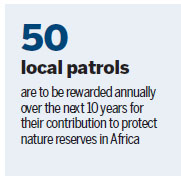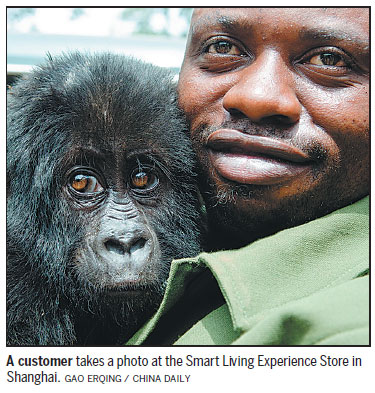

Bamboo charcoal project to prevent illegal hunting of Africa's wildlife
The Paradise International Foundation is planning to help the Virunga National Park in the Democratic Republic of Congo to establish a bamboo charcoal factory, as part of the foundation's broader efforts to help protect nature reserves in Africa.
The move came right after the Chinese non-profit environmental protection organization in July last year announced that it would set up the ranger patrols prize in nature reserves of Africa, awarding 50 local patrols annually in the next 10 years.
"Africa is the homeland for megadiverse wildlife, while it is still suffering from illegal hunting. Thus we hope to do more to preserve the nature in that land," said Jack Ma, founder of Chinese e-commerce giant Alibaba Holding Ltd and co-chairman of Paradise International Foundation.
The project aims to encourage local people to plant bamboo and produce bamboo charcoal to replace fuelwood to combat the deforestation.

Currently, the two sides have signed a large-scale equipment production contract, and the equipment is expected to be shipped to the DR Congo by the end of March this year.
Zhang Shuang, CEO of the Paradise International Foundation, said the idea dated back to 2016 during his visit to the Virunga National Park, as he noticed the local hydroelectric power station and the big plots of lands suitable for bamboo growth.
"The bamboo forest will slow down habitat loss," Zhang said. "Bamboo charcoal can replace the wood charcoal and the factory will create more employment opportunities for local people. We believe that plentiful jobs will guide the people to put down guns and choose to improve their life quality via working and production."
Launched in 2015, the foundation is dedicated to protecting the environment and wildlife. Jack Ma and Pony Ma, CEO of Tencent Holdings Ltd, serve as co-chairmen of the foundation.
Located in the eastern DR Congo, Virunga is the oldest national park on the continent and an important habitat for mountain gorillas. Currently, the total number of mountain gorillas is less than 900 in the world.
For decades, the DR Congo and the neighboring countries abutting Virunga have been mired in wars. And more than 4 million people live in poverty in the regions surrounding Virunga.
Poor local people choose to cut down trees in the national park and produce wood charcoal as well as hunt wild animals. Some even join insurgent groups to make a living. And a $35 million underground charcoal industry chain has formed, which helps fund the rebel groups that operate in that region.
Emmanuel de Merode, director of the Virunga National Park, said during a visit to China last November that the establishment of the bamboo charcoal factory will promote the development of Virunga and support the environmental protection.
"The foundation has already made successful attempts," he added. "We believe the bamboo industry chain will become a key force to drive the local economic growth and the nature protection. "
During the visit, Merode visited charcoal factories in Anji, Zhejiang province, to learn about the Chinese charcoal production experiences. "The bamboo charcoal production technology has matured in China's southern Zhejiang and Fujian province. We would like to introduce the technology to Africa and ask more local people to join the production. And thus they will have a stable source of income and it will also help stop the destruction of gorilla habitats," said Wang Dezhi, chief scientist of the Paradise International Foundation.
ouyangshijia@chinadaily.com.cn

|
Officials of the Virunga National Park and locals discover a mountain gorilla that fell victim to illegal hunting in the Democratic Republic of Congo. Provided to China Daily |
(China Daily 03/01/2018 page18)